RUSSIA
History

History

Cities in RUSSIA
| Moscow | Saint-petersburg |
History
Early Middle Ages
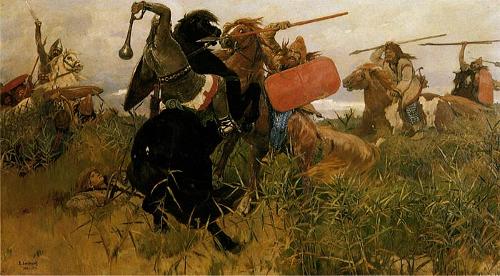 Battle between the Scythians and the Slavs, RussiaPhoto: Public domain
Battle between the Scythians and the Slavs, RussiaPhoto: Public domain
After the Great Migration, the core area of the later Russian Empire was inhabited by Slavic peoples. They were again indebted to the Khazars, who controlled the caravan routes between Europe and Asia.
Since the 6th century, the tribes from Scandinavia have penetrated Russia with boats from the Baltic Sea and conquered Novgorod and Kiev in the ninth century.
Under the inspiring leadership of their famous Scandinavian chieftain Rurik, several tribes around Novgorod were united in 862. This gave rise to the name Rossiya, which means "the land of the Russian".
The Empire of Kiev (ca.880-1240)
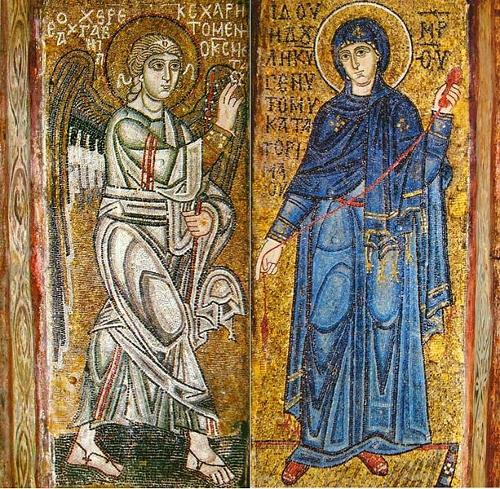 Mosaics Saint Sophia Cathedral in Kiev, ca 1100Photo: Public domain
Mosaics Saint Sophia Cathedral in Kiev, ca 1100Photo: Public domain
Rurik was succeeded by Oleg, who conquered Kiev around 880 and is considered the true founder of the Russian state. The Scandinavian tribes conquered more and more areas, but assimilated themselves as a people with the native Slavic population. In 998, Vladimir the Holy married the daughter of the Byzantine emperor, Anna. This sealed the transition to a kind of state religion, orthodox Christianity. This was of great importance for the later building of the Russian state. Vladimir's son, Yaroslav the Wise, led the Empire of Kiev-Rus until 1054 to become one of the richest and most powerful in the then Christian world.
The decline of the empire started from 1054 due to the many invasions of steppe nomads and the Slavic succession system, which led to a great fragmentation of the once powerful empire. In the 13th century it was therefore no longer possible to properly defend against attackers who came from both the east and the west. Sweden and the Teutonic Order threatened Russia from the northwest and Lithuania conquered Black Russia and Polotsk, among others.
From the east, the Mongols invaded Russia in 1237, led by Batu Chan. Within a few years almost all major cities were attacked and burned to the ground, including Kiev in 1240. This brought an end to the Empire of Kiev.
Mongols and Tatars
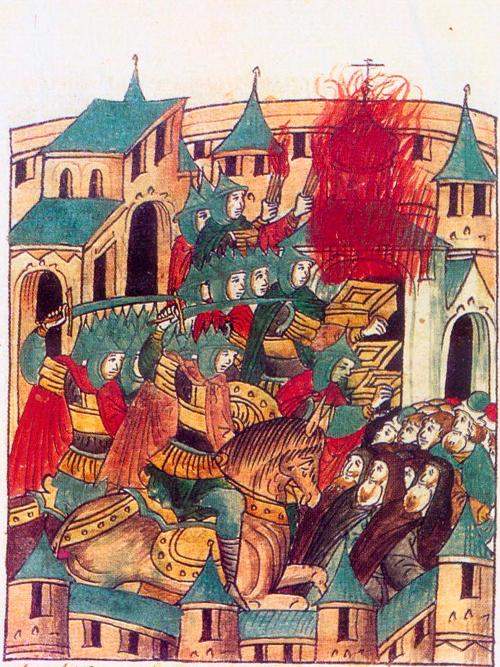 Mongol invasion of RussiaPhoto: Public domain
Mongol invasion of RussiaPhoto: Public domain
Daniel of Galicia tried to stop the Mongols, but in 1259 another invasion followed and Galicia stopped fighting. Lithuania, which had also conquered many Russian principalities, managed to inflict a heavy defeat on the Mongols at Sinyje Vody. Eastern Russia, on the other hand, suffered for a long time from the Tatars, who were doing things for the Mongols and maintaining a cruel regime.
Alexander Nevsky in particular, previously Prince of Novgorod, was humiliated as Grand Duke of Vladimir. After his death, the land was divided among his sons and Daniil became governor of Moscow. Daniil and his successors managed to expand the Moscow Empire considerably and made Moscow the core of a new Russian state.
The Tsardom of Muscovy
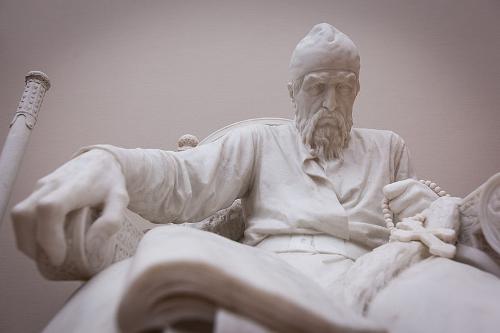 Ivan IV the terrible, RussiaPhoto: Jimmyweee CC 2.0 Generic no changes made
Ivan IV the terrible, RussiaPhoto: Jimmyweee CC 2.0 Generic no changes made
Only under Ivan III one can speak of a large Russian unified state. He conquered the last principalities and by 1480 his empire was completely independent from the Tatars. Meanwhile, the Byzantine Empire had fallen in 1453, and the Russian Grand Duke Ivan III became worldly head of all Orthodox believers. Moscow has even been referred to as the "third Rome". The title "Tsar" (of Caesar) became official upon the ascension to the throne by Ivan IV. Russia was now ruled by autocrats, and the boyars (noble landowners) were, much to their displeasure, outflanked. This led to bloody conflicts, especially under the rule of Ivan IV the Terrible (1533-1584). He exercised a terrible terror against the boyars, but after his coronation as tsar in 1547 the empire calmed down.
Ivan did try to expand his territory in all directions. In the east, Kazan and Astrakhan were conquered, but in the west Ivan suffered a heavy defeat against the Poles and the Swedes when he tried to conquer Livonia. The battle lasted 24 years, from 1558 to 1582.
The position of farmers also changed radically in the 16th century. The land they owned went to landlords and many farmers then moved to the south, among other places, where they lived a fairly independent existence as semi-nomads as Cossacks. The Cossack Yermak became famous, who began to conquer Siberia in the service of the Stroganov family.
During the reign of Ivan IV, a regular trade between England and Russia also started and later Dutch merchants were also added. In 1584 Ivan was succeeded by his feeble son Fyodor, who could not prevent power from eventually falling into the hands of Boris Gudunov, who had first held a regency on behalf of Fyodor. He managed to win another war with Sweden and thereby reclaim areas on the Baltic Sea. After the death of Fyodor, Boris became the official head of state of Russia.
17th century
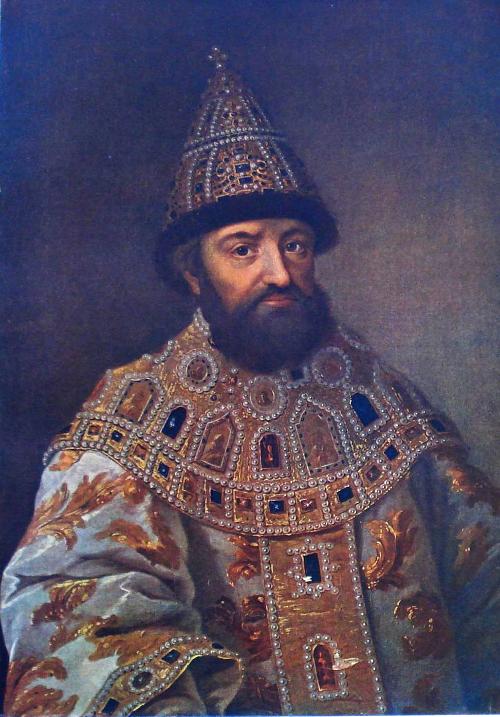 Michael Romanov, RussiaPhoto: Public domain
Michael Romanov, RussiaPhoto: Public domain
The period 1604-1613 was called the "time of troubles" and began with an invasion from Poland by the pretender to the throne Dimitri, the so-called "false Dimitri". In 1605 Boris Gudunov died and Dimitri fell to the throne. Unfortunately for him, he was soon killed by boyars. This whole period can be seen as a period of civil war and total confusion. A new Dimitri, false Dimitri II, announced himself, but he too was short-lived; in 1610 he was murdered.
After this troubled period, the clergy called on cities and nobles to join forces and save Russia from destruction. A state assembly or "zemski sobor" was then proclaimed and Michael, son of Fyodor Romanov, was elected tsar in 1613. Under Michael, peace was quickly restored. With Michael a new dynasty came to power, that of the Romanovs.
Michael was succeeded by Tsar Alexei, while the government was in the hands of his guardian and favorite Morozov. However, this administration was so corrupt that a revolt followed in 1648, which in turn prompted legislative reform. This new legislation made serfs in particular increasingly dependent on the state or on their masters. The second half of the seventeenth century was also marked by a split in the church. The so-called "raskolniki" did not want to go along with the ecclesiastical reforms.
Furthermore, a Russo-Polish war was fought from 1654 to 1667.
Era Peter the Great
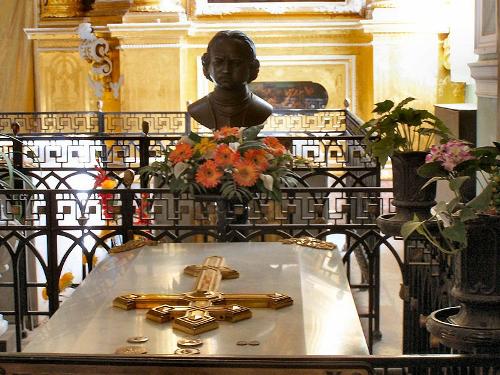 Tombe of Peter the great, RussiaPhoto: Eino Mustonen CC 3.0 no changes made
Tombe of Peter the great, RussiaPhoto: Eino Mustonen CC 3.0 no changes made
From 1689, Tsar Peter the Great, son of Alexei, ruled Russia. His main focus was abroad, especially the superpower on the other side of the Baltic Sea, Sweden. The Great Northern War (1700-1721) was important here. At the Peace of Nystad, Russia took control of a large part of the Baltic Sea coast and thus became the main power on the sea so important for international trade.
At home, everyone was tied even more to the state, the administrative apparatus modernized and the church placed under the authority of the state. Furthermore, Saint Petersburg became the capital instead of Moscow. Under Peter the Great, Russia became the most powerful state in Eastern Europe.
Era Catherine II (1762-1796)
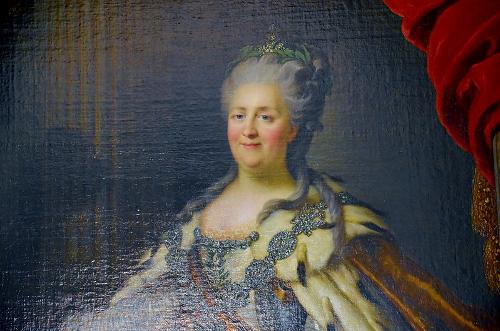 Tsarina Catherine II, RussiaPhoto:Richard Mortel CC 2.0 Generic no changes made
Tsarina Catherine II, RussiaPhoto:Richard Mortel CC 2.0 Generic no changes made
After an interval of 37 years and six monarchs, Catherine II seized power in Russia. From that time on the line of Peter the Great was also continued. This also includes the strong concentration on Western, especially French, civilization. The power of the nobility continued to expand under Catherine, while the situation for the serfs became more and more hopeless and came close to pure slavery. As a result, great peasant revolts broke out in the period 1773-1775.
Catherine achieved great military success abroad. The Black Sea coast and Crimea were conquered from the Turks, parts of Poland in the west and Courland was also annexed. Catherine was succeeded by her son Paul, who made peace with the Emperor of France, Napoleon, in 1799.
19th century
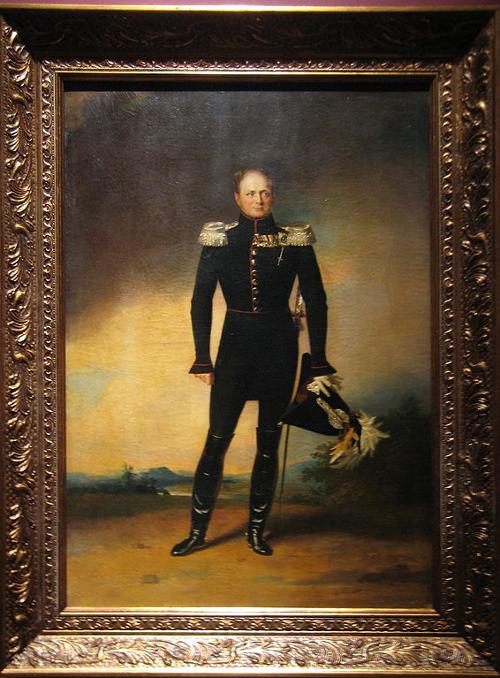 Alexander I of RussiaPhoto: Shakko CC 3.0 Unported no changes made
Alexander I of RussiaPhoto: Shakko CC 3.0 Unported no changes made
Paul was succeeded by Alexander I, who tried to implement all kinds of reforms in his first period, but failed at all. In response, the second period of his reign was characterized by the suppression of liberal thinking. In 1825 Alexander died suddenly, immediately revealing the displeasure of the upper classes with Alexander's reign.
In foreign policy, he initially fought with England and Austria against the French in the so-called Coalition Wars. In the War of the Fourth Coalition, Russia was defeated at Friedland in 1807. During the peace negotiations, he befriended Napoleon, much to the dismay of the Russian merchants and traders, who saw their lucrative trade with England endangered.
In 1812, however, Napoleon invaded Russia and Moscow was occupied for a short time. The French were eventually expelled from Russia. After the War of the Sixth Coalition, Russia acquired Poland in personal union at the Congress of Vienna, and was allowed to keep Finland.
Nicholas I (1825-1855) pursued a strict reactionary regime in which many groups were repressed. Nicholas's foreign policy led, among other things, to the Crimean War, in which Russia suffered a painful defeat. At the Peace of Paris (March 30, 1856), Russia was cut off from the Danube and the Black Sea became a neutral territory.
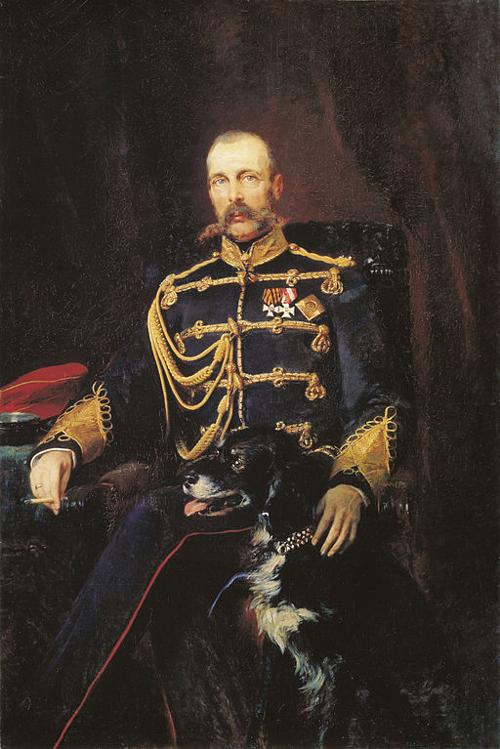 Alexander II of RussiaPhoto: Public domain
Alexander II of RussiaPhoto: Public domain
Alexander II carried out important domestic reforms, the main achievements of which were the abolition of serfdom in 1861 and the reform of local government in 1864.
In 1877 war was declared on Turkey. The Turks threatened to overrun Bosnia-Herzegovina, Bulgaria, Serbia and Montenegro, creating a nationalist-Pan-Slavist mood in Russia. After a fierce battle with the Turks, the Turks were forced into the Peace of San Stefano, which was later revised at the Congress of Berlin in 1878.
In the meantime, the Russians had also been busy and conquered, among others, Tashkent, Samarkand and the Hanaat Chiwa; The Chanates Bukhara and Kokand became Russian client states (Chanaat = principality ruled by a Chan).
Under Alexander III, almost all of the reforms initiated by his predecessor were reversed and any form of opposition was brutally suppressed. As far as foreign policy was concerned, a defensive alliance with France was made in 1893, while Chancellor Bismarck's Germany broke up.
20th century
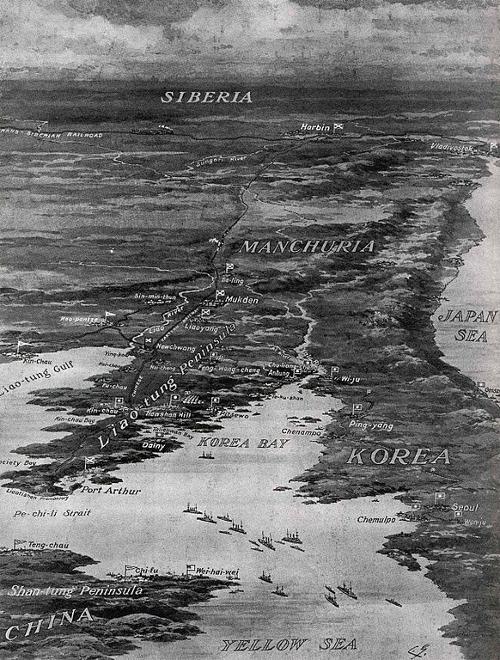 Battlefields in the Russo Japanese WarPhoto: Public domain
Battlefields in the Russo Japanese WarPhoto: Public domain
For East Asia, the Russians had an economic-military imperialist future in store. As a result, the Russians clashed fiercely with Japan, which became increasingly stronger economically and militarily. Russia had occupied Manchuria after the Boxer Uprising in 1900, but promised to vacate it by a specified date.
This did not happen and as a result war broke out with Japan that lasted from 1904-1905. This war fell very badly among its own population, after which the Russian government promised to create a parliament, the "Duma". In August 1905, however, it became known that the powers of the duma would be very limited, and that in turn generated much protest among the population. The government now took its place, and far-reaching civil liberties and democratic suffrage were promised.
However, when the Duma took a stand against the government, there was an immediate reaction and the Duma was immediately dissolved. A second duma was established but it had even more radical positions and was also dissolved. The third Duma (1907) did not last long either, and the fourth Duma (1912) was also increasingly in conflict with the regime.
Moreover, the peasants, workers and intellectuals became increasingly hostile to the government based on conservative circles (nobility and capitalists).
Russian Revolution
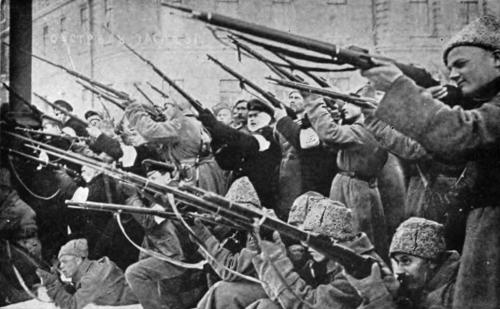 Revolutionaries attacking the Tzar's police during the first days of the Revolution, RussiaPhoto: Public domain
Revolutionaries attacking the Tzar's police during the first days of the Revolution, RussiaPhoto: Public domain
Russian tsarism had been greatly weakened in early 1917 by the defeats and losses in World War I and the great rift that had developed between landowners and entrepreneurs and peasants and workers.
On February 17, 1917, a bread riot broke out in Petrograd. The rulers called in the army, but the soldiers refused to intervene. To restore order, the Duma established an executive committee, while the workers formed councils, the so-called "soviets", together with soldiers. In response, the army leadership sided with the Soviets, after which the Tsar resigned and handed over power to his brother Michael. However, he refused, after which the Duma appointed a provisional government headed by Prince Lvov.
The socialists, divided into revolutionary socialists and social democrats, gained more and more influence through the creation of more soviets. These soviets organized many provincial and one major national congress, from which a central executive committee was elected in June, acting as the official representative of all soviets to the provisional government.
Meanwhile, the position of that government was weakening, with the local government often already taken over by the soviets. At that point the Duma and the police organization had already disappeared. The program of the provisional government, a continuation of the war in Europe, no abolition of large land ownership and a liberal form of government, caused great unrest.
In April 1917 there was a demonstration against the belligerent minister Miliukov, after which it became clear that the provisional government would not survive without the socialists. A coalition government was therefore formed on 5 May with the moderate socialists. Their policies were opposed from the outset by the leader of the so-called "Bolsheviks," Lenin. His main demand was that all power belong to the soviets.
When the Minister of War, Kerensky, nevertheless continued to wage war and suffered a severe defeat in Galicia, an uprising broke out in Petrograd led by the Bolsheviks, who now demanded all power from the Soviets. However, the central executive committee of the soviets refused to cooperate and the Bolshevik party was banned and Lenin fled abroad. The chairman of the important Petrograder Soviet, Trotsky, was arrested.
On August 27, another revolt threatened by the commander in chief of the army, General Kornilov. However, most of his soldiers committed insubordination, which failed this liberal and conservative-backed attempt to establish a military dictatorship.
Kerensky unable to do anything and a power vacuum was created. Farmers increasingly took possession of estates and factory workers en masse joined the Bolsheviks, who were more or less in control in large cities such as Moscow and Petrograd. At the end of September Lenin announced an armed insurrection from Finland, which was being prepared by Trotsky. On October 25, strategic points in Petrograd were occupied by Trotsky's troops. Some resistance was offered in Moscow and southern Russia, but in fact the Bolsheviks met no major opposition anywhere. On October 26, the second general congress of all soviets was held, with the Bolsheviks clearly in the majority. The first official Bolshevik government was therefore elected at the suggestion of Lenin.
Period Lenin
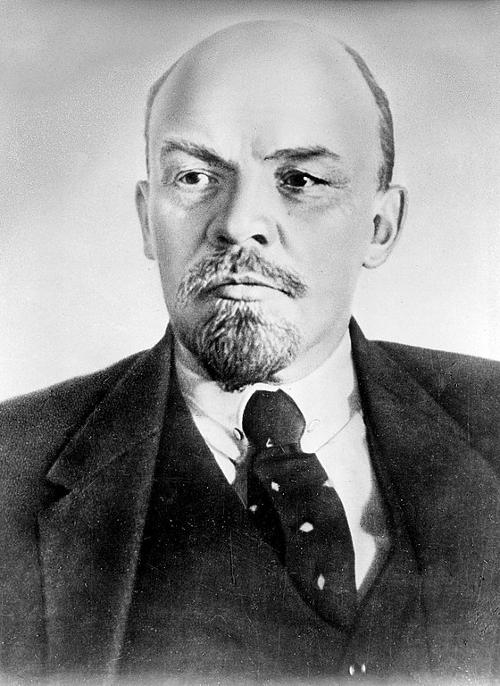 Lenin, RussiaPhoto: Wwamirhosseinww CC 4.0 International no changes
Lenin, RussiaPhoto: Wwamirhosseinww CC 4.0 International no changes
The settlement of the First World War caused a lot of problems. On December 2, 1917, a difficult truce was signed. The Germans launched another offensive, but on March 3, 1918, the Treaty of Brest-Litovsk was concluded, ending the war on the Eastern Front. Lenin was the great animator behind this peace treaty, much to the dismay of a large number of Bolsheviks and the Left Social Revolutionaries in the government.
In order to maintain power, a number of decrees were issued and the political opposition had a hard time, including censorship and the use of violence by the secret police, the Cheka. The real power of the Bolsheviks, however, was limited only to Central Russia.
From the spring of 1918, the Antibolsheviks really took off. Thus, the so-called Czechoslovak legion conquered Siberia, and the east coast was occupied by the Americans and the Japanese. Right-wing groups formed armies but found no support among the peasant population, who were afraid of losing their own land. The left-wing Socialist Revolutionaries staged a coup d'état in July 1918 and committed several attacks, which in turn triggered great activity by the secret police. However, this civil war could never be won by the "whites", because they were insufficiently organized and, moreover, had to compete against an army of 5 million men.
Russia, meanwhile, had also gone to war with Poland due to a border dispute. A definitive boundary was established at the Peace of Riga on October 12, 1920.
The development of communism, the power to the people, fell on two minds. On the one hand, industry was being nationalized at an accelerated pace, but on the other, a reinforced party dictatorship seriously hindered the development of workers' power. There was much dissatisfaction about this and this led to an uprising in the garrison town of Kronstadt in March 1921. However, this revolution was bloody suppressed. In 1922, a treaty was signed between the Ukrainian and Belarusian Soviet Republics and the Russian Soviet Federative Socialist Republic and the Union of Soviet Socialist Republics, the USSR, was established.
However, discontent among large groups in society became more intense and Lenin decided to grant some liberties, the so-called New Economic Policy (NEP). The NEP was reasonably successful because in 1928, despite an initial famine and high unemployment, the economic level of 1913 was again reached.
Period Stalin
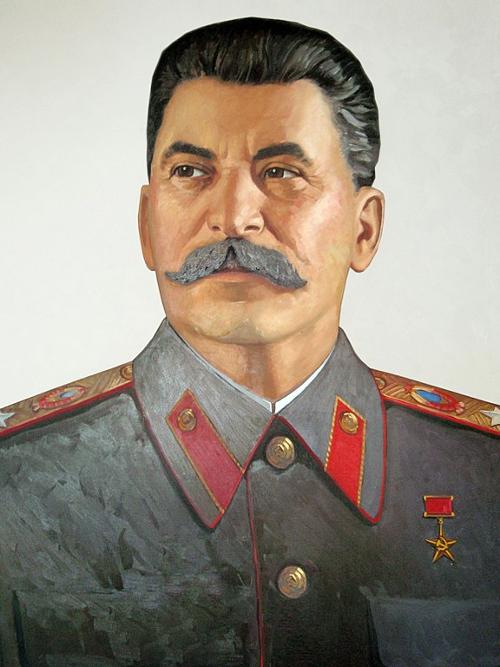 Stalin, RussiaPhoto: Ephraim Stillberg CC 3.0 Unported no changes made
Stalin, RussiaPhoto: Ephraim Stillberg CC 3.0 Unported no changes made
Politically, there was still turmoil, and this got worse when Lenin fell seriously ill in 1922 and the struggle for his succession began. At first it seemed to be Trotsky, but he faced opposition from a triumvirate, the secretary-general of the party, Joseph Stalin, taking the lead. However, the struggle for power continued; Stalin wanted to maintain the NEP politics and pursue socialism, Trotsky wanted rapid industrialization at the expense of the peasants and pursued permanent revolution. At the end of 1927, Trotsky was sidetracked and Stalin adopted his ideas and found himself opposed to his former allies Bukharin, Rykov and Tomsky. The resistance of this group was broken in 1929, after which one man held all power: Stalin.
Stalin's foreign policy was dominated by the ideological broadening of the communist revolution, but also in a traditional policy, in which the own state was paramount. The world revolution therefore failed to materialize and more and more treaties were concluded with other countries, followed by recognition in 1924/1925. A treaty was concluded with Turkey in 1921, and with Germany in 1922 by the Treaty of Rapallo, but after the murders of communists, cooperation with the government of Chinese leader Tjiang K'ai-shek was ended.
The first five-year plan was put into effect domestically in 1928, as a result of which efforts were made to rapidly bring (heavy) industry to a higher level. In 1929 a collectivity program for agriculture was started. Initially the farmers did not cooperate and in 1932/1933 a great famine followed and a lowered standard of living due to the forced unilateral industrialization.
The Stalin period was further characterized by personality cult and people were no longer allowed to have their own ideas. After a hesitant thawing period, a period of state terror by the secret police followed in the period 1936-1938. Important former leaders were convicted and the entire military top was liquidated. Approx. 5% of the population was affected by the terror.
WWII
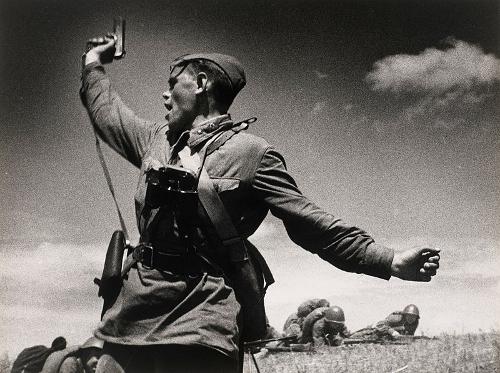 Soviet officer leading his soldiers in WW II, RussiaPhoto: RIA Novosti archive, image #543 / Alpert CC-BY-SA 3.0 no changes made
Soviet officer leading his soldiers in WW II, RussiaPhoto: RIA Novosti archive, image #543 / Alpert CC-BY-SA 3.0 no changes made
In foreign policy, people increasingly moved to the west and not to Germany and Japan. Alliances were even made with countries such as France and the Soviets joined the League of Nations.
On the eve of World War II, the Soviets failed to cooperate with the Western powers against Germany's National Socialism. Nevertheless, a treaty was concluded with the Soviet Union in August 1939; the Molotov-von Ribbentrop Pact. When World War II broke out, Germany and the Soviet Union divided Poland, Russia unsuccessfully attacked Finland, but annexed the Baltic States in 1940. However, Germany turned out not to be trusted and in June 1941 the two superpowers faced each other.
German troops penetrated Moscow and besieged Leningrad. At that time Stalin took over all offices in the country and was at that time party leader, prime minister and people's commissioner of defense. The Battle of Stalingrad was to be the final defeat of the Germans, after which the Soviet armies moved rapidly towards Berlin. Internationally, the Soviet Union was strengthened from World War II, as several areas were added to the empire, including Eastern Poland and the northern part of East Prussia. After the end of the war in Europe, the Soviet Union attacked Japan in Manchuria and took possession of the Kurils and South Sakhalin in the east. More important than these conquests was the fact that the Soviet Union gained a decisive influence in the countries it liberated in Eastern Europe, with the exception of Yugoslavia. All countries in Eastern Europe were given a communist regime and that would largely determine world news for decades.
The post-war period was dominated by Stalin's personal dictatorship. Science and culture were bound by very strict regulations and contacts with the West were limited. Purges and locking up dissidents and other unwanted persons in so-called "gulags" were the order of the day.
Period Khrushchev
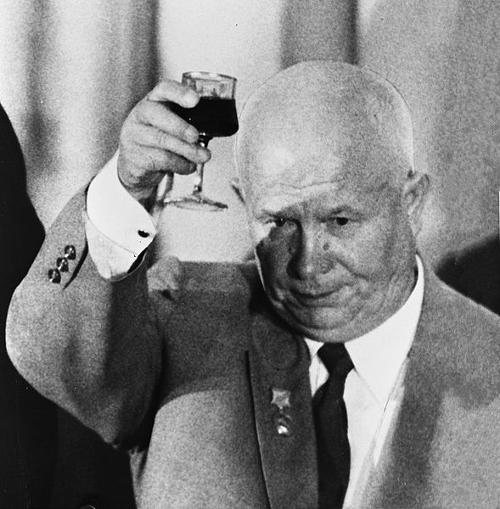 Khrutschev, RussiaPhoto: Public domain
Khrutschev, RussiaPhoto: Public domain
After Stalin's death in 1953, a struggle for supremacy broke out between Khrushchev, Malenkov and Beria. In March 1953 Khrushchev became party secretary and in the years 1955-1957 his opponents were sidetracked. At the 20th Party Congress in 1956, Khrushchev dealt with the Stalin period and Stalinism, but in fact only the excesses of the regime were criticized; the communist system remained intact. Yet things did change for the common people, in the sense that there were more personal freedoms and more security was guaranteed. However, this only lasted for a short time as this de-Stalinization led to the "Polish Spring" in Czechoslovakia and the Hungarian uprising in 1956 in Hungary. The Soviet Union quickly retreated and the old situation was restored by early 1957.
Khrushchev, meanwhile, was both party and government leader and his opponents had disappeared from the highest party organs. His economic policy increasingly focused on the consumer industry and no longer on heavy industry.
In terms of foreign policy, there were a number of major crises in relations between the East and the West, particularly the United States. Some examples are the Suez Canal (1956), Berlin (1958) and the Cuban Missile Crisis (1962). Relations with the other communist superpower China also came under severe pressure and even led to a split in 1963. Border disputes led to explosive situations in 1969 that just did not get out of hand. The generally bad economic situation in the Soviet Union and especially the difficult agricultural situation led to the fall of Khrushchev in 1964.
Period Brezhnev
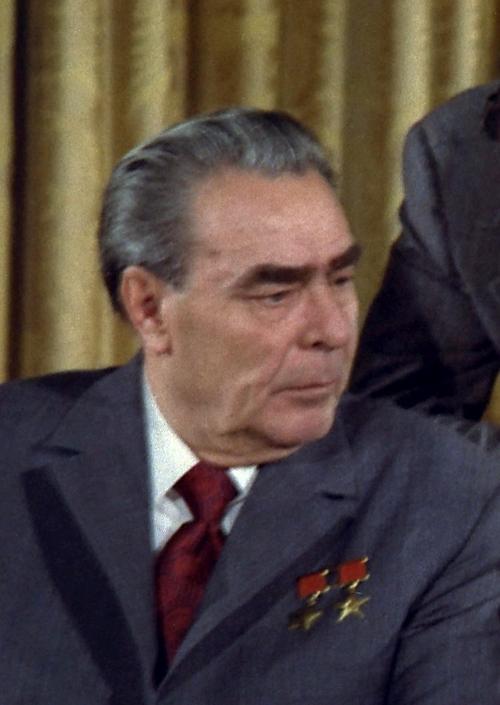 Brezhnev, RussiaPhoto: Public domain
Brezhnev, RussiaPhoto: Public domain
Khrushchev was succeeded as party leader by Leonid Brezhnev and as prime minister by Kosygin. However, they too were unable to force an economic breakthrough, on the contrary, the economic problems continued to accumulate.
The period of Brezhnev-Kosygin was characterized in the interior by a definitive return to the repressive policy before the de-Stalinization. The secret service (KGB) and the judiciary were constantly looking to subtly or harshly sideline the so-called "democratic opposition". Many dissidents were also forced to emigrate to the West.
Yet the opposition among intelligentsia and the (forbidden) churches emerged and came to stand against the party framework and the army. Marxism-Leninism as an ideology lost more and more ground among the population in those years, while Russian nationalism was reviving, especially in military circles.
Foreign policy under Brezhnev increasingly tended towards relaxation, despite the bad relations with China and, for example, the Soviet invasion of Czechoslovakia (1968). The relationship with the Federal Republic of Germany in particular improved considerably and the normalization of relations between the German Democratic Republic, a puppet state of the Soviet Union, was important. A good sign was the signing by the Soviet Union of the Helsinki Final Act in 1975.
Relations with the United States were reasonably good in the early 1970s under Richard Nixon's presidency. After Nixon, another cooling-off period followed under Carter and Reagan, which was partly caused by the Soviet expansionism in the third world and also the position in the oil-rich Middle East in relation to the Americans. The Soviet invasion and subsequent war in Afghanistan (1979-1989) was a low point in the relationship between the two superpowers, and the military coup in Poland (1981) did not help that relationship either.
Period Gorbachev
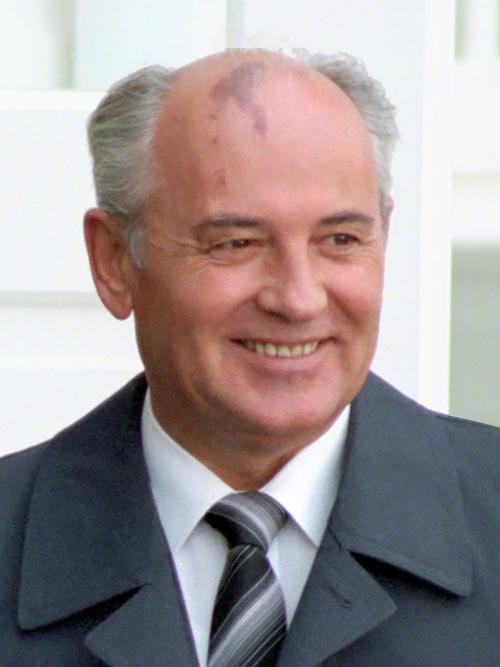 Gorbachev, RussiaPhoto: The Official CTBTO Photostream CC 2.0no changes made
Gorbachev, RussiaPhoto: The Official CTBTO Photostream CC 2.0no changes made
After the death of Brezhnev and the intervals between Andropov and Chernenko, Mikhail Sergeevich Gorbachev came to power and was appointed Secretary General of the Communist Party on March 11, 1985.
Gorbachev's policy was based on openness ("glasnost") and innovation ("perestroika"). At the 27th Party Congress in 1986 it was decided to improve and perfect the electoral system and to improve the work of the elected organs of the popular power. However, the party remained the leading force behind this process.
On January 10, 1988, the time had come: in by-elections for the Supreme Soviet, a choice was possible between two candidates for one seat in a constituency. These were the first free elections since November 1917, although both persons were members of the communist party. After the 19th Party Congress, constitutional changes were made in December 1988 with regard to electoral law, parliament and the judiciary. In addition to being a party leader, Gorbachev also became chairman of parliament. From this time on, this parliament would also determine politics in Russia. The until then powerful politburo lost more and more power and the party apparatus was gradually dismantled.
As a result of these radical developments, all kinds of nationalist movements began to emerge in the constituent republics, which quickly pushed for full sovereignty. Elections in these republics were, of course, all won by national popular fronts.
On March 11, 1990, Lithuania unilaterally declared independence. The Soviet Parliament responded by passing a law setting out the contours of a new federative structure. By passing an Withdrawal Act, they tried to turn the tide, but this would prove to be in vain. Estonia and Latvia took steps towards autonomy and Boris Yeltsin's RSFSR (Russia) passed a declaration declaring themselves sovereign. In concrete terms, this meant that the RSFSR itself would decide whether a law adopted by the Soviet Union would also apply in its territory (the so-called war of laws).
Forced by changing circumstances, the first draft of a new Union agreement was published on 24 November 1990. During this period Gorbachev began to surround himself with some conservative advisers and ministers to restore power in the center. A referendum on the preservation of the Soviet Union was held on 17 March 1991 and consultations followed between Gorbachev, Yeltsin and the leaders of the eight remaining republics.
These consultations led to an agreement between Gorbachev and the republics on April 23. The new text of the Union Agreement was due to be signed on August 20, but it never happened. On August 17, the conservative leaders of the republics decided on a coup, which, however, was very ill-prepared and failed due to the poor cooperation of the army. The courageous actions of Yeltsin, who had already been elected president of the Federation in June 1991, would be important for the further history of Russia.
As a result, however, the republics concluded that the Soviet Union no longer existed. On September 5, the Congress of Deputies agreed and proposed a transition period. Furthermore, the Soviet Union recognized the independence of the three Baltic states.
At the time, negotiations for an Economic Community were underway, but Ukraine was very hesitant. At the time of the coup in August, this important republic had already declared its independence and had called a referendum for it. The population voted in favor en masse and the Ukraine immediately declared itself officially independent, effectively ending the existence of the Soviet Union.
Russia, Ukraine and Belarus founded the Slavic League at the end of December, which was expanded on December 21 to include most other republics in the Commonwealth of Independent States (Sodruzjestvo Nezavisimych Gosudarstv). In the south of Russia, the Chechens proclaimed the republic of Chechnya in 1991.
Period Jeltsin
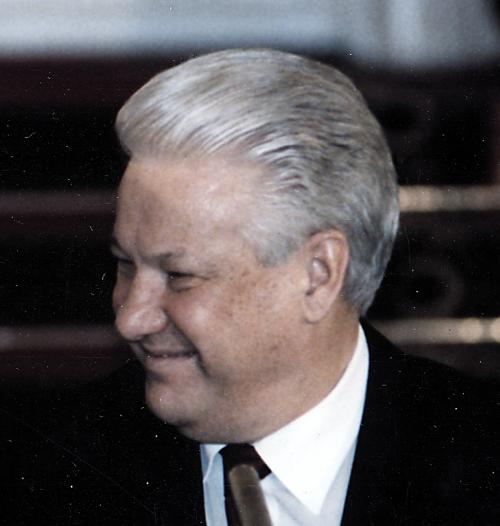 Jeltsin, RussiaPhoto: Public domain
Jeltsin, RussiaPhoto: Public domain
On December 25, 1991, President Gorbachev resigned and the Soviet Union was officially dissolved on January 1, 1992. On that date, the Russian Federation officially became an independent state.
Yeltsin immediately took some tough economic decisions; for example, state controls on prices were released and state-owned companies were privatized. The first measure in particular did lead to hyperinflation, which did not improve the dire economic situation very much.
In March 1993, the People's Congress passed a vote of no confidence towards Yeltsin's economic and political reforms, but the required two-thirds majority was just missed. A referendum on these matters worked out favorably for Yeltsin, considerably strengthening his position. However, the crisis around Yeltsin continued because in September the congress denied Yeltsin the right to, among other things, legislation. A vote was taken to oust Yeltsin and Vice President Alexandr Rutskoy became president. The new president and parliament chairman Hasbulatov even called for an uprising against Yeltsin. Armed supporters of both figures occupied Ostankino Town Hall and Television Center on October 3, 1993.
Yeltsin-loyal troops quickly ended the uprising, and Rutskoy and Hasbulatov were captured. Elections and a referendum were again held in December. A new constitution was also passed, giving the president even more powers. The communists and the far right also received a lot of votes, which made the government increasingly conservative. It was significant that in January 1994, two important reformers, Gajdar and Fedorov, had to leave the field.
In February, all those detained in coup attempt attempts in 1991 and 1993 were released. Chechnya was again in the news in 1994. In the second half of 1994, a conflict broke out between Chechen President Dudayev and the pro-Russian opposition. Yeltsin issued an ultimatum, but at the end of December Russian troops entered Chechnya and bloody fighting took place. In June 1995, Chechen rebels took approximately 1,500 people from the Russian city of Budyonnovsk hostage in revenge. Russian security forces tried to end the hostage situation, but some 100 people were killed.
At the end of July, the Russian forces withdrew, although agreement on the sovereignty question was far from being reached. In June 1994, Russia joined NATO's Partnership for Peace, but continued to strongly oppose NATO expansion with the accession of some former Eastern Bloc countries.
Elections to the State Duma in 1995 clearly showed the great division between them. The communists and the ultra-nationalist Liberal Democratic Party won a lot of votes due to the deteriorating socio-economic situation the country was in.
The economic crisis persisted despite the rise in industrial production and the growth of the economy in 1995. The main reason for this was that government deficits could not be tackled simply by printing money. Despite reassuring figures from the government, it was well known that more than 40% of the labor force was unemployed.
The presidential elections of June and July 1996 were again won by Yeltsin, who defeated communist Zyuganov in the second round. Yeltsin continued with economic reforms, but the only thing that succeeded in reducing inflation. In order to continue the reforms in full, Anatoli Chubais was appointed Deputy Prime Minister and Finance Minister in 1997 and Boris Nemtsov as Deputy Prime Minister. Meanwhile, the fighting in Chechnya had continued and in April 1996 rebel leader Dudayev was killed. An armistice was signed in August and a peace treaty was signed on 12 May 1997. At the end of February 1996, Russia had already become a member of the Council of Europe.
In March 1998, Yeltsin fired the entire cabinet of Prime Minister Chernomyrdin without further notice.
The Russian Federation played an important role in the 1999 Kosovo crisis. The Russians were deeply involved in the negotiations between the Serbs and the Kosovars during the February and March negotiations in Rambouillet and Paris. Russia was clearly on the side of the Serbs, and then strongly opposed the NATO air strikes over Serbia after the failure of the negotiations. Ultimately, the Russians would play an important role in finding a diplomatic solution to the conflict.
On May 6, Russia agreed to the terms for the cessation of the bombing. Serbia thus lost one of its main supporters and there was no other option than to follow the demands of the G8 at the beginning of June. To keep the peace, Russia sent more than 3,600 soldiers to Kosovo.
Period Putin first and second term
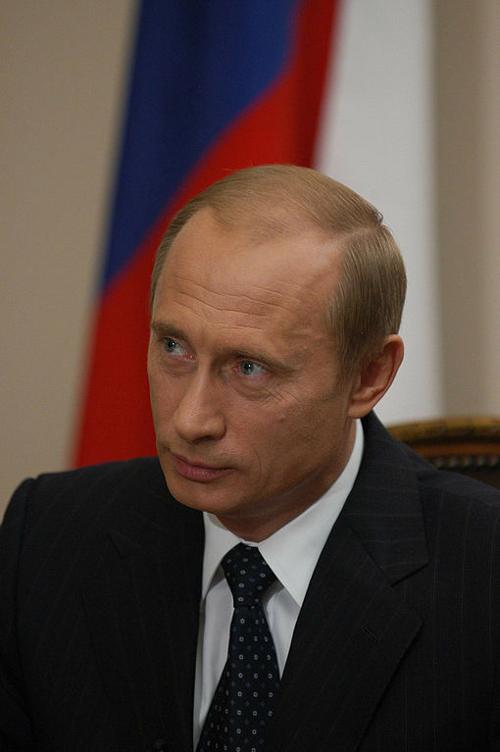 Putin, RussiaPhoto: Kremlin.ru CC 3.0 Unported no changes made
Putin, RussiaPhoto: Kremlin.ru CC 3.0 Unported no changes made
On May 12, 1999, President Yeltsin fired Prime Minister Primakov and all his ministers. Home Secretary and First Deputy Prime Minister Stepashin was appointed by Yeltsin as his successor, but he was suddenly fired on August 9.
Yeltsin then nominated the head of the Secret Service and President of the Presidential Security Council, Vladimir Putin, as Stepashin's successor. He also appointed Putin as his intended successor.
The December 19, 1999 Duma elections were gloriously won by Putin and his Unity party. Putin was popular among the population because of the crackdown on the problems in the rebellious Chechnya Republic.
On December 31, 1999, President Yeltsin unexpectedly announced his resignation and appointed Prime Minister Putin as acting president.
Presidential elections were held on March 26, 2000, and Putin was elected president by an absolute majority and was sworn in on May 7. Putin appointed Mikhail Kashanov prime minister.
Putin's priority was to strengthen central state authority and enforce the law. He wanted to limit the power of the regions and the autonomous republics, of course with Chechnya as a specter in mind. He established seven federal districts by decree on May 13 to oversee compliance with federal laws.
On 28 June, the new government presented a reform program, focusing on reform and simplification of the tax system, modernization of the banking system and increased supervision of privatized monopoly companies, such as Gazprom.
Furthermore, Putin declared war on the 'oligarchs', the group of businessmen who had made big money and gained great political influence under Yeltsin. The tax authorities and the judiciary began investigating several magnates, who were suspected of embezzlement and tax evasion.
On August 12, the Kursk, a nuclear submarine of the Russian Navy, sank during exercises in the Barents Sea. The accident was seriously discredited by the Russian authorities, and it was not until the end of October that divers managed to remove twelve corpses from the submarine.
Russian attempts to break resistance in the renegade Autonomous Republic of Chechnya were unsuccessful. Informal contacts with the Chechen president, Aslan Masjadov, ultimately did not lead to negotiations. The local government installed by Russia failed to gain authority, so Russian soldiers and Chechen rebels continue the bloody battle with all their fierce. The rebels were not only active in Chechnya itself. In March 2001 they hijacked a Russian airliner in Turkey and detonated three car bombs in South Russia.
Still, international support for Russia's action in Chechnya grew, but that was merely a result of the September 11 attacks on the World Trade Center in New York and the Pentagon in Washington. In his support for the fight against international terrorism, President Putin said that the war in Chechnya cannot be ignored. According to him, it was also about counterterrorism. President Bush, following Putin, called on the Chechen rebels to cut off their contacts with international terrorists. Within Russia, too, support for military action in Chechnya grew after September 11.
Russia developed into an important strategic partner of the West in 2001, thanks to the September 11 terrorist attacks on the United States. After the attacks, President Putin pledged support for the international campaign against terrorism and fully agreed to the US airstrikes on Afghanistan. During a visit to Germany, Putin called for the creation of a new security system, with important roles for Europe and Russia. Cooperation with NATO has also been deepened. Putin nuanced Russia's opposition to NATO expansion, and ties with the United States were also strengthened.
Relations with China, the largest buyer of Russian weapon systems, also continued to improve. Both countries signed a friendship treaty on July 16.
President Putin maintained his strong political position and remained popular with the common people, despite the hopeless war in Chechnya. In the Duma, he had a reassuring majority of members who were sympathetic to him. Things got even better for him when Unity and Fatherland-All Russia (OVR) merged in February and continued under the name United Russia.
According to an opinion poll, appreciation for his decisive actions during the Moscow hostage drama in October even increased his rating in November to a record high of 83%. On October 23, 50 Chechen rebels raided a musical theater in Moscow and took more than 750 visitors hostage. The rebels demanded the end of the war in Chechnya and the immediate withdrawal of the Russian army.
President Putin this year stuck to the pro-Western course he had set after the attacks of September 11, 2001. During the state visit of US President Bush to Moscow, both presidents signed a treaty on May 24 to reduce their nuclear arsenals. Russia also did not oppose the expansion of NATO, which the alliance decided in November 2002.
Russia pursued the plan to end the conflict in Chechnya through a new constitution and the election of a new president. On March 23, a referendum was held on the new constitution, which stipulated that Chechnya would remain a full part of Russia. 96% of the voters voted in favor of the law, which would further give Russia more say in the autonomous republic. Voters also voted in large numbers for the election of a new president and a new parliament.
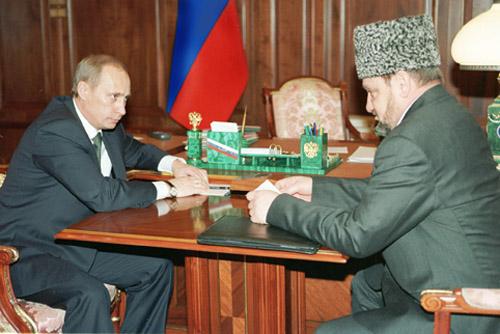 Putin meets Kadirov, RussiaPhoto: Kremlin.ru CC 3.0 Unported no changes made
Putin meets Kadirov, RussiaPhoto: Kremlin.ru CC 3.0 Unported no changes made
Human rights organizations criticized the referendum, partly because Russian soldiers stationed in Chechnya were allowed to vote. Presidential elections were held on October 5, and Achmed Kadirov, backed by Moscow, received 81% of the vote. Characteristic of the situation was that the main rival candidates withdrew before the elections. Rebel leader Aslan Masjadov, Chechnya's legally elected president, had rejected the Russian plan.
Putin also remained popular in 2003. A July poll found that if presidential elections were to be held at that time, he could count on 49% of the vote. The communist Gennadi Zyuganov would not have gotten more than 13%. On December 18, Putin declared that he would stand for re-election in the presidential election of March 14, 2004.
In the months before the British-American intervention, Russia opposed military action by the United States against Iraq. According to Moscow, the UN weapons inspectors should be given as much time as they needed to find weapons of mass destruction. Russia would then veto a Security Council resolution that would pave the way for military intervention.
On May 23, Russia agreed to UN Security Council Resolution 1483. The resolution recognized the British-American occupation authority and provided for the designation of a UN special envoy to Iraq. The Bush-Putin summit on September 26-27 reaffirmed that the Iraq issue had not harmed relations. Putin, for example, renounced the French demand to hand over sovereignty to the Iraqis as soon as possible. According to him, the transfer was a complex matter and it took more time.
Parliamentary elections were held on December 7. United Russia received 37.57% of the vote, the Communists (KPRF) 12.61%, the Zhirinovsky Liberal Democrats 11.45% and the Motherland Bloc 9.02%. The other parties failed to reach the 5% electoral threshold. The result was a serious setback for the opposition, as the communists lost half of their voters and the reform-minded parties Jabloko and SPS did not even meet the electoral threshold and disappeared from the Duma. Putin strengthened his position as United Russia, the pro-presidential party, took 223 of the 450 seats. With the help of two well-disposed Putin parties, the two-thirds majority needed for constitutional changes seemed within reach.
It had long been clear that Putin would be re-elected in the presidential election on March 14. He received 71.2 percent of the vote. Shortly before, he had fired his Prime Minister Mikhail Kashanov and his government, who had served him for nearly four years, but had always acted as relatively independent towards Putin.
Observers saw the dismissal mainly as an election stunt to add color to a boring presidential campaign. On March 1, he nominated the relatively unknown director Mikhail Fradkov as prime minister, and on March 5, the State Duma approved the prime minister's appointment.
On May 9, a bomb attack at the stadium in the Chechen capital Grozny killed the pro-Russian president of Chechnya, Akhmed Kadirov. The attack was likely committed by Chechen rebels and dealt a severe blow to Putin's Chechnya policy.
Putin still has a lot of goodwill among most of the Russian population, because many see in him a strong leader, and he is in the economic tide: the Russian economy today is one of the fastest growing in the world, although it was hit by the Yukos affair and according to many the economy is still too focused on minerals such as oil and gas.
However, progress has been made with regard to agriculture during Putin's presidency. At the end of 2005, the Russo-Ukrainian gas dispute broke out, which also affected some countries in Europe and prompted some observers to say that Russia is trying to tighten its grip on its "near neighbors". The Russian economy is increasingly focused on India and China, where there is a great demand for Russian raw materials, weaponry and nuclear energy technology, among other things. Many Chinese are also moving to southern Siberian cities, leading some nationalists to call it an "invasion", but other forecasts indicate that immigration is slower than previously thought.
Problems such as Chechnya, the negative population growth, the deplorable state of the Russian Army (including the persistent problematic Dovshchina), the nationality problem, crime (such as mafia groups) and terrorism are far from resolved, and sooner or later they can arise again. can come to the fore. Under Putin, corruption continued to grow between 2001 and 2006 to seven times what it was before his presidency.
Period Medvedev
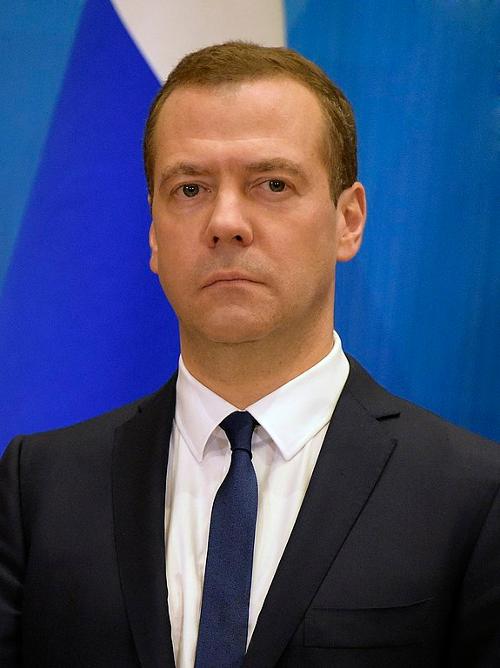 Medvedev RussiaPhoto: Government.ru CC 4.0 International no changes made
Medvedev RussiaPhoto: Government.ru CC 4.0 International no changes made
Putin was expected to step down after his second term in office in 2008. Several groups within Russia have tried to get Putin to consider accepting a third term by changing the constitution, mainly out of fear that Russia will collapse after Putin's resignation. will deposit. In the Russian presidential elections in May 2008, Putin's kindred spirit and fellow party member Dmitry Medvedev emerged as the winner. Putin will assume the prime position under him, and as the party says, act as his big brother. This actually continues the Putin era.
In August 2008 the conflict with Georgia turned into a military strike. After a week of hostilities, the parties sign a peace agreement. Russia does recognize the renegade provinces of South Ossetia and Abkhazia. In January 2009, Russia will stop gas supplies to Ukraine. Ultimately and after much pressure, both countries sign a new agreement for a period of ten years. In July 2009, Medvedev and Obama signed an agreement to limit the supply of nuclear weapons. In late 2009 and early 2010 there were suicide attacks by Muslim militants from the Caucasus.
In June 2010 Medvedev visits Obama in the White House, the atmosphere between the two leaders is relaxed. In October 2010, Medvedev fired the popular Moscow mayor Juri Luzhov.
Period Putin third and fourth term
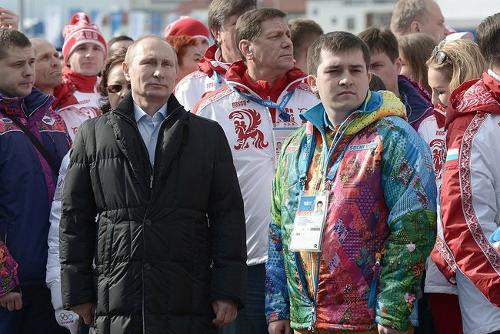 Putin olympic games Socchi, RussiaPhoto: Kremlin.ru CC 3.0 Unported no changes made
Putin olympic games Socchi, RussiaPhoto: Kremlin.ru CC 3.0 Unported no changes made
In March 2012, Putin is elected president again and in May 2012 he appoints Medvedev as prime minister. In August 2012, members of the punk group Pussy Riot were sentenced to 2 years in prison, the EU and human rights organizations protest against this verdict. In December 2013, Putin is engaged in a charm offensive. He pardons his former opponent Khodorkovsky and releases those on board the Arctic Sunrise, including two Dutchmen. A link is made with the Sochi Olympics in February 2014. Just after the Olympics, the crisis surrounding Ukraine breaks out. Russia is intervening to protect its citizens in Crimea, according to its own words. The United States and the EU announce sanctions if Putin does not withdraw his troops. In May 2014, Gazprom signed a deal with China to supply that country with oil for 30 years. The west sees this as Putin's response to the impending sanctions.
In June and July 2014, Russia received a lot of criticism over arms transfers to the pro Russian separatists. Especially the drama surrounding the downing of the Malaysian airliner with 298 passengers on board, including 194 Dutch people, is heavily blamed on Russia for allegedly supplying heavy weapons. In February 2015, opposition leader Boris Nemtsov is shot dead in front of the Kremlin. From September 2015, Russia intervenes in the conflict in Syria with air strikes. Turkey downed a Russian plane in November 2015, resulting in tensions and mutual sanctions. In September 2016, Putin increased his majority in the parliamentary elections. The EU is continuing sanctions against Russia in June 2017 because of the country's role in the Ukraine conflict. Putin visits Syria in December 2017 and declares that the Russian armed forces have accomplished their task. The Olympic committee is excluding Russia from the 2018 Winter Games due to Sochi's state-sponsored doping program. In may 2018 Vladimir Putin is inaugurated for fourth term as president after beating minor candidates in the March election. In 2020 president Putin announces plans to change the constitution ahead of the end of his presidential term in 2024, and dismisses the government. In august 2020 Russian opposition politician Alexei Navalny was poisoned with a Novichok nerve agent and has been transferred to a german hospital. Navalny returns to Russia and is imprisonned.
At the end of 2021 and at the beginning of 2022 tensions between Ruusia, Ukraine and NATO are at their highest in years, with a Russian troop build-up near the two nations' borders spurring fears that Moscow could launch an invasion.Ukraine has warned that Russia is trying to destabilize the country ahead of any planned military invasion. Western powers have repeatedly warned Russia against further aggressive moves against Ukraine.
In February 2022 Russia invades Ukraine, prompting the biggest East-West showdown since the Cold War.
Sources
Graaf, A. van der / Reis-handboek Sovjet-Unie
Elmar
Rusland, Centraal-Azië en de Kaukasus
The Reader’s Digest,
Russia & Belarus
Lonely Planet
Te gast in Rusland
Informatie Verre Reizen
CIA - World Factbook
BBC - Country Profiles
Copyright: Team The World of Info